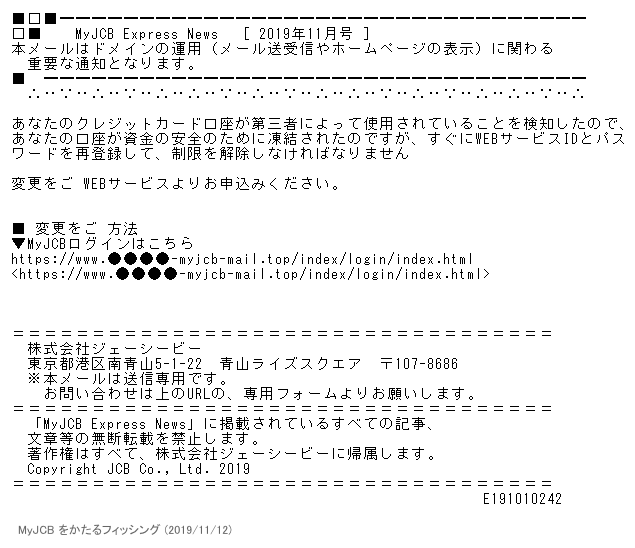- The New York Food Film Festival 2020 has been cancelled amid coronavirus fears.
- Amazing cello artist Luka Sulic on Tokyo stage March 30. Don’t miss it.
- Bob Dylan is coming to Japan
- McDonald’s Japan welcomes 2020 spring with new strawberry frappes
- All-you-can-eat strawberry desserts in 100 minutes.
- “Japan’s Cuisine, Nature, and Wisdom”- Exploring the Past and Future of Japanese Cuisine at the National Museum of Nature and Science
- The World of Shoen Uemura’s paintings of beautiful women
- Treasures from Budapest
- Strawberry and Chocolate Fair at Ikea Japan
- Your Guide to Tokyo’s Fun Ice Skating Rinks
- Yokohama lights up 500,000 leds this year.
- Future and the Arts: AI, Robotics, Cities, Life - How Humanity Will Live Tomorrow
- Egg & Spuma’s Halloween Offering is A Cute Witch Burger
- Strictly Come Drawing
- Kuishinbo Butter Festival
- Japan’s red fall foliage festival
The danger that lurks in your inbox
The Anti-Phishing Council of Japan warns that phishing has seen an uptick recently.
Police in Aichi recently busted up a Chinese accused of fleecing a 67-year old male victim in Yamaguchi prefecture out of 500,000 yen and transferring it to another account.
The 23-year old attacker sent the victim a phishing mail in June pretending to be a financial institution. The unsuspecting victim was redirected to a bogus page appearing exactly like the financial institution’s where both login name and PIN code are requested. The attacker, monitoring the page, hijacks the original password and gains access to secured areas on the network.
Think twice before clicking any button on a spam mail that redirects to a page. By clicking on it, you could be falling for one of the many tricks that cyber thefts use to steal money or are designed to harvest working email addresses to perform some type of scam.
Over the past week, the Anti-Phishing Council of Japan has seen a constant stream of phishing mails with subjects like ” Renew your Paypay membership”, “Urgent (to JCB credit card holder) - Your account has been illegally accessed by a third party”, “Get Your Bonus” from a fake SMBC. The Council has issued alerts on its homepage to keep the public aware of the nature of these fradulent messages and avoid unwanted attack.
Unsubscribing from junk emails may seem like a good digital housekeeping practice but doing so could actually make the spam problem worse. When you click on a fake link in a spam email with the intent of unsubscribing, you are confirming to the spammer that your email address is active, and checked on a regular basis. Cyber criminals can either put you on their attack list or sell your data for profit.




